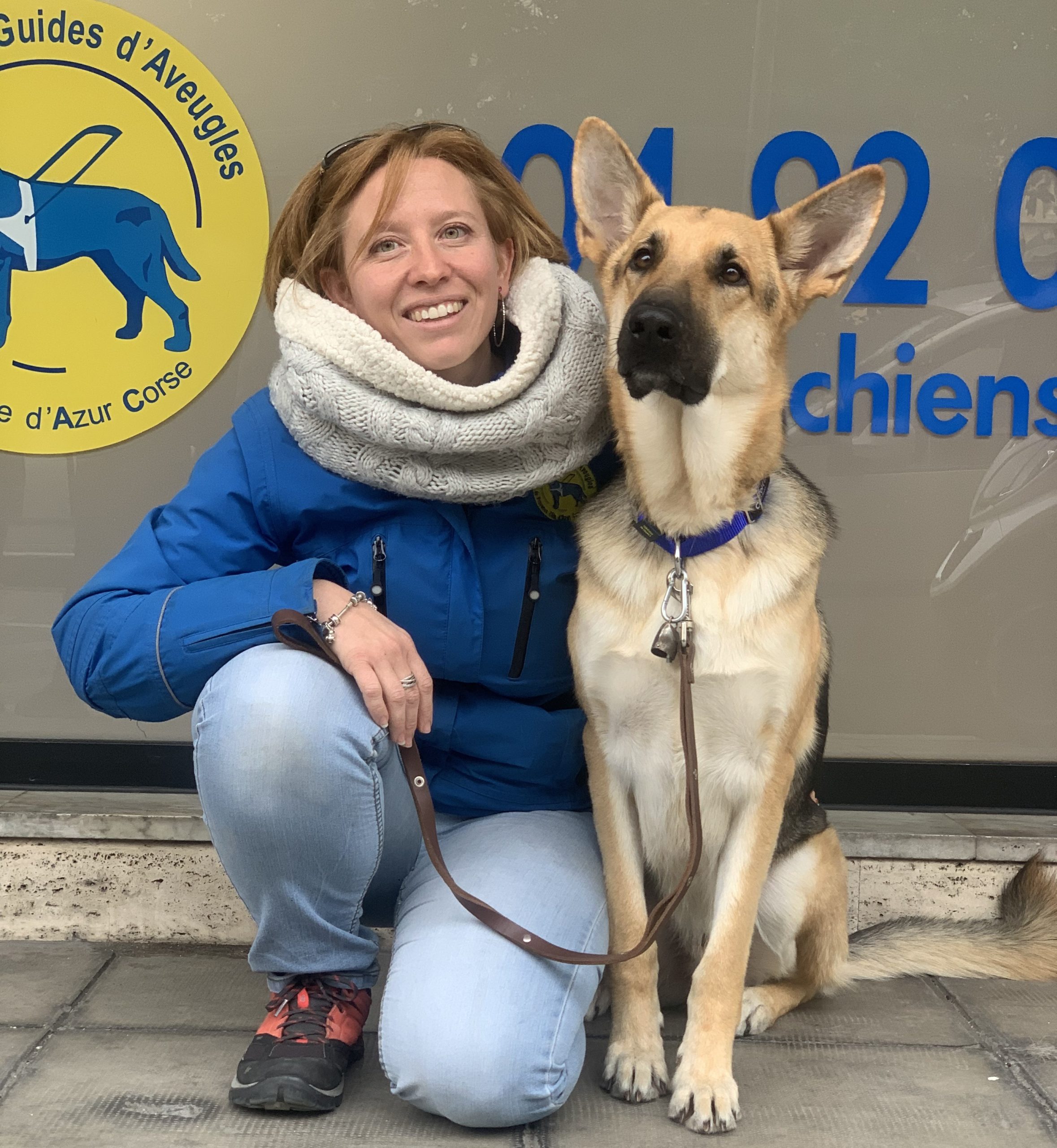From a passion for dogs to an unwavering commitment to others
Interview and photograph kindly provided to IGDF by Fédération Française des Associations de Chiens guides d’aveugles (FFAC) www.chiensguides.fr
Our 50th anniversary was an opportunity for the French Federation to focus on the story of these women and men who have decided to work every day for the cause of guide dogs, by training these outstanding companions to guide the steps of those who need them so much. We met Sandrine Lebreton who has been working for the cause for 13 years. After having dreamt of becoming a veterinarian, she finally found a daily fulfilment in the job of GDMI. Among her achievements, 48 guide dogs graduated, and she has forgotten the names of none nor the routes worked with their owners. Being an instructor is much more than a job for her, it is a passion, a day to day dedication that she would not change for anything in the world!
How did you discover the profession of guide dog mobility instructor?
I’ve had a passion for dogs since I was a little girl. My dream was to become a veterinarian. After a school discovery stay at a veterinarian’s, I came back there for every holidays until I was 16. That’s where I saw a guide dog for the first time. I thought that what the dog could do for its owner was just amazing. So, when I failed the entrance exam to the veterinary school, I turned to training guide dogs, without any regrets. I didn’t know the activity, but I had been to kennel clubs with my own dogs where I practised training and agility. I applied to all guide dog schools in France and it was Ecole de Chiens Guides d’Aveugles de Provence Côte d’Azur Corse who responded favorably; I’ve been working there with passion for 13 years now.
Have you ever regretted having followed this new path?
Absolutely not, because I’ve found a real balance. Being an instructor allows me to combine my passion for dogs with my desire to help others. It is so rewarding to practice a profession that is not routine, that requires constant adaptation because each dog is different, and each breed has its own character and individual traits. I wake up every morning knowing that every day will be different and that I’m going to be with my dogs. Even rainy weather cannot dampen my motivation, being with them always makes me feel good.
What qualification struck you most?
I think it will remain the first team I trained, because it confirmed that I had made the right choice. The user was an 18-year-old girl, blind from birth. After school in an ordinary environment, she got her guide dog just as she left home to start physiotherapist studies. I remember how well she did with the cane. I think she’s so improved her guide dog that it is even better than when I gave it to her (laughs). Over the years, I have enjoyed following their evolution and telling myself that on my modest level I had contributed to it, it is a real satisfaction.
What is your connection to the visually impaired people you follow up?
You become like a member of the family. Sometimes I feel like a godmother they can count on if they have any questions. It’s a very special bond that is created each time, it goes much further than the dog, these are real life stories. I feel full of gratitude to be able to be part of this chain of solidarity that can transform people’s lives.
Do you have examples of transformation of lives that you are proud of?
Sometimes, it may not seem much from the outside, but I once allowed a man to be able to pick up his daughter from school every day – what a huge step it was for him and how proud he was! I’m glad I was able to contribute to that. Some other times, the transformation is even more spectacular. I remember a very introvert lady who couldn’t stand being touched. She had been abused as a child and found it difficult to reach out to others. When she came back eight years later, she was a different person. She had come out of her shell, and that was thanks to a dog, which is extraordinary.
How do you manage separation with the dogs you train?
For the first guide dog I trained, it was very hard for me as the young instructor that I was at the time. I took a slap in the face as they say, I realized that I had to work on myself, I couldn’t keep it, that was not the purpose of my work. You have to find the right place in the relationship. Today, when people ask me how I can let them go, I always answer that these dogs are meant to do something much bigger than my own happiness.
What satisfaction do you get from your job?
On the last day of the training session, when I see the dogs leave without hesitation with their new owner, I have the feeling that they understand that this was the purpose of everything they were taught. Dogs live in the moment. They remember us, but we are not their life. When you see the dog, in relaxation time, come back to check that their owner is okay, you tell yourself that you have succeeded.
